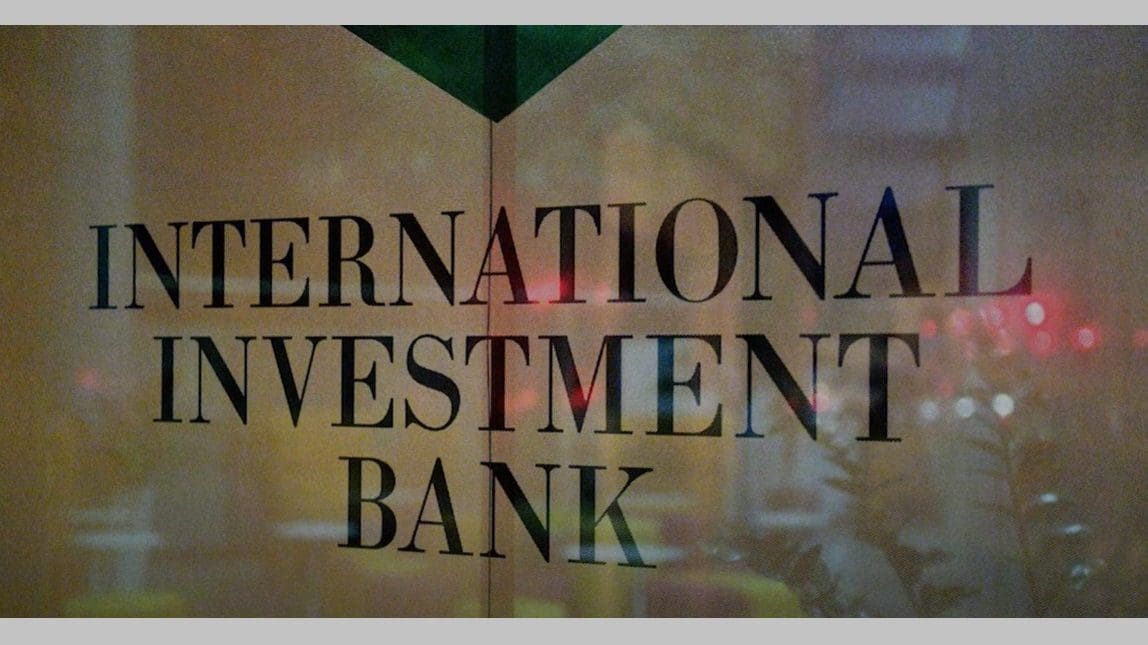The International Investment Bank (IIB) was established in 1970 under the auspices of the Comecon as an international institution, with the purpose of fostering bilateral economic ties and cooperation between the countries of the Soviet bloc. The bank has been providing funds for various projects, while also giving out loans for various medium- and long-term investments. Since its establishment in 1970, it has financed over 300 projects for around 9 billion EUR combined.
Currently, the IIB has a total equity of around 2 billion EUR. For an investment bank, it was never one of the large ones—the bank’s paid-in capital was about 425 million EUR as opposed to the European Bank for Reconstruction and Development (EBRD)’s 6.2 billion EUR. Before Hungary announced its withdrawal from the institution in April 2023, Russia held just under 50 per cent of its stakes, while Hungary’s share in the company was the second largest, 25.27 per cent.
As of now, the IIB has only four members left—Russia, Cuba, Mongolia, and Vietnam. Its former members were Poland (until 2000), and some states that do not exist anymore, like the Soviet Union, East Germany, and Czechoslovakia. The fact that most of the ex-members are states that no longer exist is testimony to the bank being an essentially Soviet-era remnant and that many of the Central and Eastern European countries were—so to say—legacy members of the bank. Now, with yet another rapid change in geopolitical circumstances, all EU member states of the IIB decided to turn their backs on the institution. Bulgaria, Hungary and Romania are leaving this year, while the Czech Republic and Slovakia did so last year, right after the beginning of the Russian invasion of Ukraine.
The IIB’s Fate Has Always Been Tied to Geopolitics
The International Investment Bank’s fate has, to a large extent, been tied to geopolitics from its foundation. During the Soviet times, the IIB claimed considerable success. Its biggest investment was funding the construction of the 2,750-km (around 1,700 miles) long Orenburg gas transmission line. Seven Eastern bloc countries played a role in the project: Bulgaria, Czechoslovakia, Poland, the GDR, Romania, the USSR, and Hungary.
After the collapse of the USSR the bank, although it survived the demise of the socialist regimes in the region, fell into a state of inactivity. Poland and Hungary left the bank in the 2000s, with Hungary doing so in 2000 under the first Orbán government.
After one and a half decades of vegetation, however, the bank was taken over by a new leadership and revived in 2012.
The revitalisation, as part of which the IIB issued bonds in Russia, Slovakia, and Romania, also encouraged Hungary to re-join in 2015, just about the same time when the first IIB regional office was opened in Slovakia. The revitalisation efforts coincided with Hungary’s ambitions to build economic connections with the East. The Opening to the East policy that aims to find new business partners for Hungary beyond the EU and the Western world in general, and open up new frontiers for Hungarian businesses promoted the seeking of renewed economic connections with the IIB. As a hallmark of the hopes attached to the IIB in 2019, its headquarters were relocated from Moscow to Budapest, thereby, making it the only multilateral development bank headquartered in Central Europe. Business was going well: in 2021, the IIB posted a record profit of 7.9 million EUR (by comparison, the EBRD’s profit in the same year was 2.5 billion EUR).
With the changing tides in the stormy sea of geopolitics, the IIB is again in a dire situation, just like it was after the collapse of the USSR. Since Russia is only a minority owner of the IIB, the institutions was not officially sanctioned until most recently. However, trust in the bank has been greatly undermined. Euroclear, for instance, froze a considerable amount of the bank’s assets as early as 28 February last year. While the decision was challenged, the Belgian Finance Ministry ruled in October 2022 not to release the funds. The IIB assets that were blocked were believed to be 50 million USD, 11 million EUR, 340 million HUF, and 736 million RUBL.
The freezing of these assets caused concerns about IIB’s liquidity, therefore Fitch soon withdrew IIB’s rating, while Moody’s placed it in the non-investment grade category. By now, some believe that the bank is on the brink of insolvency. On top of its solvency issues, the financial institution has also lost many of its members—Czechia, Slovakia, Bulgaria, Romania, and, most recently, Hungary announced their complete withdrawals. The departure of former members again raises financial concerns for the IIB.
As of now, it is unclear whether these countries will ever get their paid-in assets back from the bank.
Four of the departing EU countries (not including Hungary) could claim up to 135 million EUR from the IIB. Hungary is estimated to have around 200 million EUR in the bank, which Budapest will not necessarily get back. Poland is believed to have never recovered any of its paid-in investments.
Hungary announced to leave after the US Treasury imposed sanctions on the bank. The bank’s President (Nikolay Kosov), Vice President (Imre Laszlóczki), and Deputy Chairperson of the Management Board (Georgy Potapov) were all sanctioned on 12 April 2023, a day before Hungary pulled out of the IIB, leaving the IIB without any EU members. In the wake of these developments, its headquarters is about to be moved back to Moscow. Around 100 employees of the bank, some of whom enjoy diplomatic immunity, are also expected to leave Hungary and go home to their respective countries.
Hungary justified its decision of leaving the IIB by arguing that due to the changed geopolitical circumstances and the newly-imposed sanctions, the operation of the bank in the region has become untenable. While a decade ago, it was reasonable to attach some hopes to the institution in an effort to diversify Hungary’s economy by looking for new economic opportunities in the East, the changed geopolitical situation has rendered participation in the IIB pointless.
Katalin Novák on Twitter: “I welcome the decision of the Hungarian🇭🇺 government to withdraw its representatives from the International Investment Bank and will quit it. In the shadow of war in Ukraine, the bank’s operation had lost its meaning; steps are needed to bring us closer to peace. / Twitter”
I welcome the decision of the Hungarian🇭🇺 government to withdraw its representatives from the International Investment Bank and will quit it. In the shadow of war in Ukraine, the bank’s operation had lost its meaning; steps are needed to bring us closer to peace.
The Projects IIB Helped Fund in Hungary
Many of the projects that the IIB has funded in Hungary were connected to creating a more sustainable country, or simply providing funding for miscellaneous companies. While it is important to note that the below-outlined projects are not representative of the full activity of the bank in Hungary, they were shared on the bank’s website as ‘selected projects’ between the years 2016–2019, and thus they do give an insight into what aspects the bank deemed important in their involvement in Budapest.
Based on these annual reports, in 2019, the IIB was involved in a clean water project called ‘Happy Tisza’ that aimed to study plastic pollution in Hungary’s second-largest river. In 2018, a project took place that supported the export of pharmaceutical products from Hungary to Russia. Also in 2018, the institution provided financing for a new green-field investment in Mélykút to develop a waterfowl processing plant. In 2017, the annual report mentions a loan of 20 million EUR that the IIB provided to MOL. Prior to that, in 2016, the bank worked together with Sberbank Hungary, along with the Hungarian office of the World Wildlife Fund.
Supporting sustainability was an important and regularly voiced mission of the IIB—even its mission statement claims that the bank works on ensuring sustainable and inclusive growth and the competitiveness of national economies.
A Frowned-Upon Presence in Budapest
One of the most frequently voiced criticisms regarding the bank was the security threat it apparently posed. The IIB is frequently described as a ‘Trojan horse’ or as a ‘spy bank’, as well as an ‘arm of the Russian secret service’. The allegations about the bank’s connections to secret services are not new—even during its operation in Soviet times, it was believed to have close relations with the KGB. After the IIB’s revitalisation, and, most importantly, after it moved its headquarters to Budapest, it was yet again accused of being a ‘spy bank’ for requesting (and receiving) diplomatic immunity for many of its staff members. The immunity, in fact, granted its members easy access to the Schengen Area without much oversight of what they were doing in the Union.
In addition to the diplomatic immunity, the bilateral agreement between the participating countries that regulates the bank also does not oblige the IIB to report about its activities to the Hungarian authorities. As the IIB is not required to conform to any accounting standards, little information is available about its operations. In 2020, 53 opposition MPs turned to the Hungarian Constitutional Court, claiming that the privileges granted to the IIB violate the Hungarian Fundamental Law. The Court rejected the complaint as unfounded.
But the bank’s fate was eventually sealed after the Russian aggression against Ukraine, with the final blow probably being the 12 April announcement by the US Treasury of sanctions against the IIB and its top leadership. The Department of the Treasury justified the move by stating: ‘The IIB’s presence in Budapest enables Russia to increase its intelligence presence in Europe, opens the door for the Kremlin’s malign influence activities in Central Europe and the Western Balkans, and could serve as a mechanism for corruption and illicit finance, including sanctions violations’.








